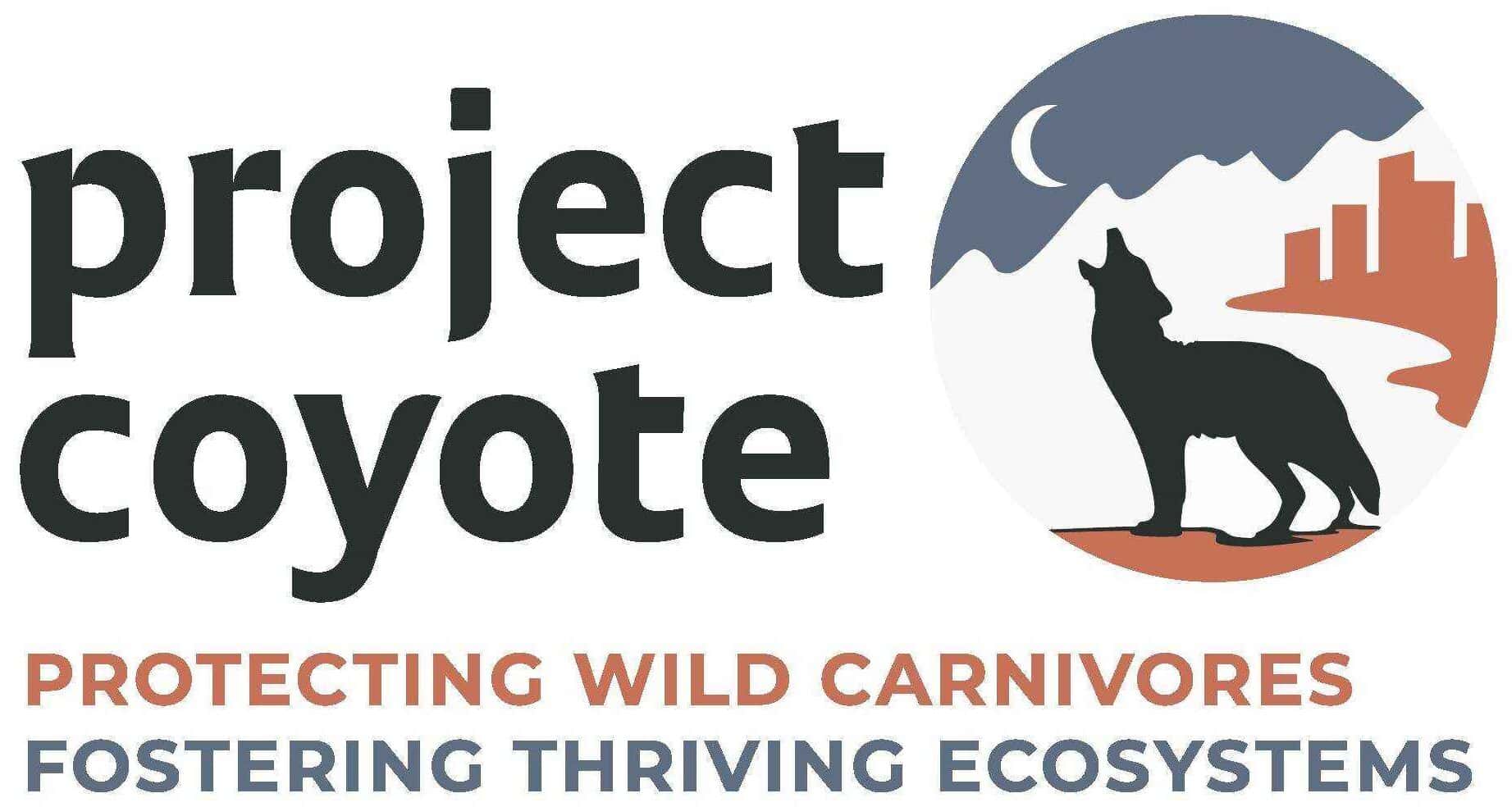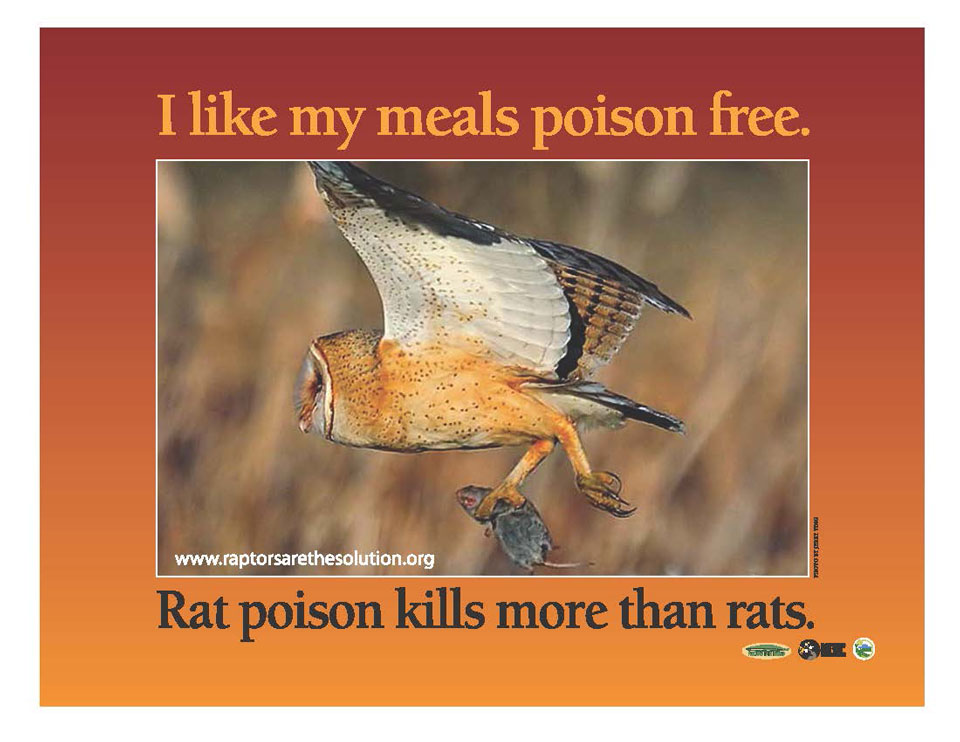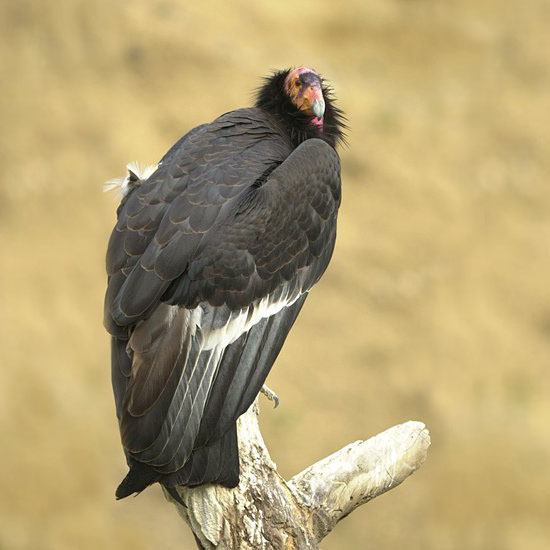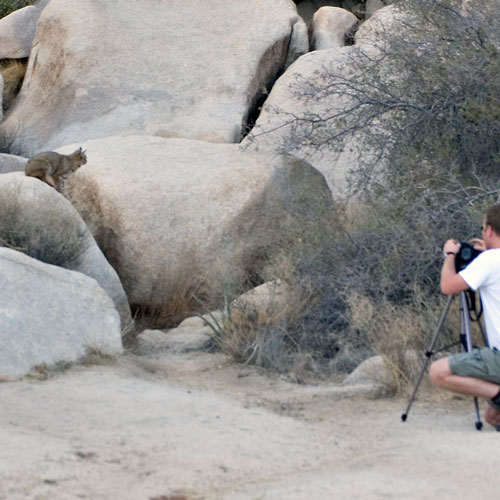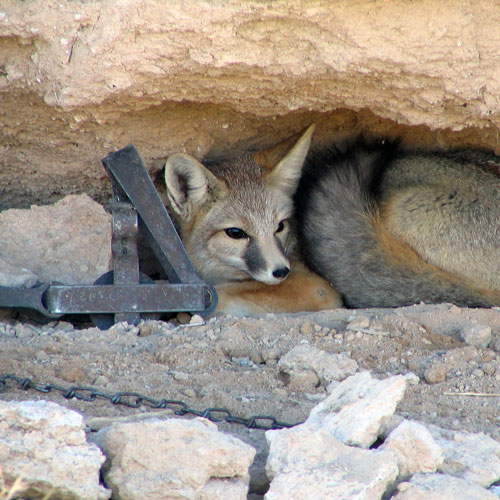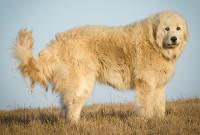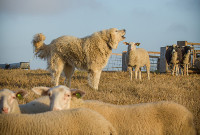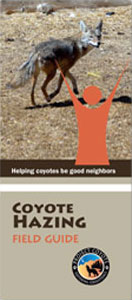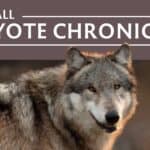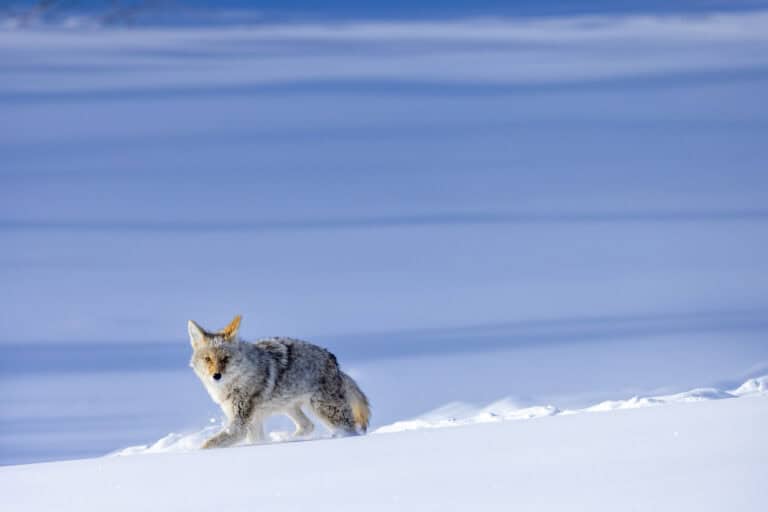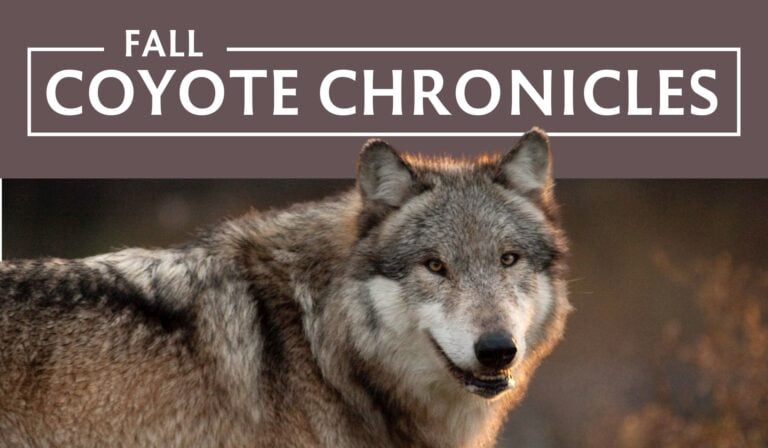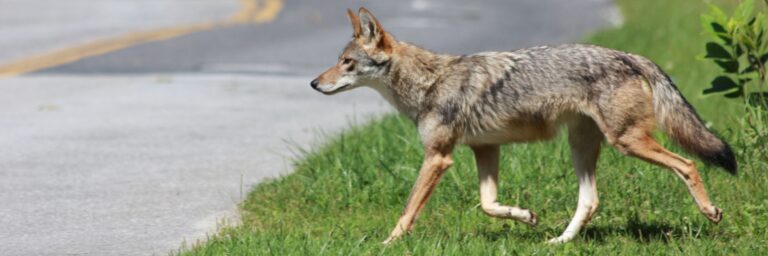OCTOBER 2013 IN THIS ISSUE:
- Threats to Keystone Species
- Exposing cruelty
- In the Spotlight
- Wild Things
- Speaking out for Wolves
- Living with Apex Predators
- Good News for Wildlife!
- In the News…
- Calabasas Passes Anti-Rodenticide Resolution
- Coyote Fact
October 2013
THREATS TO KEYSTONE SPECIES
Apex predators face escalating persecution and threats. As keystone species, their presence is critical to maintaining the structure and integrity of healthy native ecosystems; yet they are further threatened with losing protection at the federal and state levels. Project Coyote is speaking out against the recent proposal by the U.S. Fish and Wildlife Service to remove the gray wolf from the list of threatened and endangered species. We also worked with allies to uncover the brutal practices at an Indiana coyote penning facility, uncovering illegal confinement and horrific animal suffering. Results are detailed in the new report, Indiana Coyote Penning – An Inside Look at Animal Abuse and Cruelty.
Project Coyote works to reform the way federal, state, and local governments manage wildlife by working toward much needed legislative changes to ensure greater protection for wildlife. I am thrilled to report that California Governor Jerry Brown recently signed three positive wildlife bills into law, including AB 711, which bans the use of lead ammunition – making California the first state in the nation to do so. And the City of Calabasas, California passed a resolution against the use and sale of rodenticides – a significant victory for all wildlife harmed by these deadly poisons. Read more below about these achievements.
As you read this newsletter, Project Coyote representatives are fostering the message of coexistence across North America in an effort to shift the paradigm from killing to coexistence. From Massachusetts to California, urban and rural audiences are learning why native carnivores matter and how we can learn to peacefully live with them. At the International Wolf Symposium in Duluth, Minnesota, Project Coyote Science Advisory Board Member Dr. Paul Paquet delivered a powerful plenary speech challenging recreational hunting and trapping of wolves as the U.S. Fish and Wildlife Service considers removing federal protections for wolves. Read his speech here and an article about this debate here.
And finally please join me in welcoming two new members to our growing team, Keli Hendricks and Dr. Jeremy Bruskotter!
Exposing Cruelty
Indiana Coyote “Penning” Investigation Released
Project Coyote and partners released the results of an investigation into an Indiana penning operation, uncovering extreme animal suffering and providing strong evidence that wild coyotes are often illegally confined and killed by hunting dogs in such facilities. Penning, which is legal in at least 19 states, is the practice of using wild coyotes and foxes as bait to train hunting dogs. The wild canids are trapped (generally with leghold traps or snares) and often shipped and traded across state lines and sold to penning facilities. The animals are then released into pens and chased by hunting dogs who often catch and tear them apart. Read the full report here.
IN THE SPOTLIGHT
Meet Keli Hendricks
Advisory Board
Project Coyote is excited to welcome Sonoma County predator-friendly rancher Keli Hendricks to our team. A lifelong advocate for predators, Keli believes that ranchers and wildlife can coexist without conflict. At odds with the lethal management practices she saw commonly used, Keli works to replace long held fears with effective, non-lethal practices that support stewardship of the land and wildlife. Keli and her husband, rancher Dean Spinelli, live and work on the 500 acre Bar C R Ranch in Petaluma, California. Listen to Keli address questions about predator-friendly ranching in a panel discussion here. Keli also represented Project Coyote at the Sacramento Rally for Wolves earlier this month. Offered from the perspective of a responsible rancher who cares about wildlife, Keli shared her insights on the return of wolves to California. Read more about Keli here.
Meet Dr. Jeremy Bruskotter
Science Advisory Board
Project Coyote is proud to announce that Dr. Jeremy Bruskotter, Associate Professor at the School of Environment and Natural Resources at Ohio State Univeristy has joined PC’s Science Advisory Board. Dr. Jeremy Bruskoter’s research interests center on the social and political dimensions of wildlife conservation and management. His current research efforts involve understanding and predicting attitudes and behaviors related to wildlife conservation, especially tolerance for large carnivores. Follow Jeremy’s blog which is dedicated to “bringing the tools and techniques of the social sciences to bear on pressing issues in wildlife management, and making this research…accessible to wildlife professionals and conservationists.” Link to Jeremy’s blog here. Read more about Jeremy here.
Wild Things
In collaboration with the Natural Resources Defense Council, Animal Legal Defense Fund, and other partners Project Coyote co-sponsored several Northern California screenings of the award-winning documentary Wild Things.
Wild Things reveals the problems plaguing the USDA’s Wildlife Services (WS) predator control program and sheds light on the humane, non-lethal methods that many ranchers have adopted to protect livestock and to coexist with carnivores.
Project Coyote Executive Director Camilla Fox and Science Advisory Board members Dr. Robert Crabtree and Becky Weed are all featured in this important film. The Marin County Livestock and Wildlife Protection Program is also discussed as a model for coexistence.
In the panel discussions that followed, panelists shared their perspectives on the value of humane, ecologically sound livestock protection practices and the need for reform within the WS program.
The Lark Theater panel discussion can be accessed here. Panelists included Camilla Fox (ED, Project Coyote), Keli Hendricks (Predator-Friendly Rancher and Project Coyote Advisory Board), Marcia Barinaga (Barinaga Ranch, Predator-Friendly Rancher, Marin County) and Anita Sauber (Marin County Dept. of Ag.).
Speaking Out for Wolves
From Sacramento, California to Washington, D.C., Project Coyote Reps. joined forces with other wildlife conservationists to speak for continued federal protections for the endangered and ecologically vital gray wolf.
The U.S. Fish & Wildlife Service’s proposal to remove federal ESA protections from the remaining gray wolves in the lower 48 states (with the exception of Mexican gray wolves) would leave management to the states. We need only look toward the aggressive management practices and increased killing that resulted following the loss of federal protection for wolves in the Northern Rockies and Great Lakes to understand why this decision will undoubtedly be detrimental to the conservation of wolves.
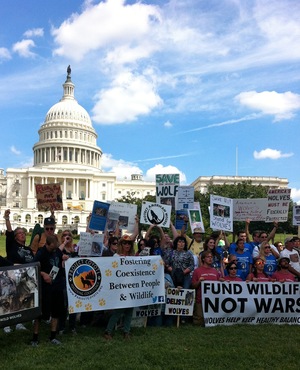
© Michele Chandler
Maintaining federal protections under the ESA is critical if gray wolves are to recover throughout their historic range. Their protection should not be abandoned as wolves have only begun to recover in many regions.
The public comment period will remain open through October 28th. Please voice your opposition to the proposal to delist gray wolves from the ESA by submitting a comment here to the FWS. MAKE YOUR VOICE HEARD!
Living with Apex Predators
A Conversation with Peter Coyote, Camilla Fox and Dr. Robert Crabtree
Distinguished actor and writer Peter Coyote, a passionate advocate for wildlife and wild nature who serves on Project Coyote’s Advisory Board, was joined by Camilla Fox and Dr. Robert (Bob) Crabtree, Project Coyote Science Advisory Board Member and Yellowstone Ecological Research Center’s Chief Scientist in conversation at the Outdoor Art Club in Mill Valley to share their insights and expertise on how to coexist peacefully with native carnivores (coyotes, wolves, bears, mountain lions, etc.) and why they deserve our full respect and increased understanding.
The event, sponsored by the Marin Community Foundation, was the first of the Commonwealth Club’s new “Marin Conversations.” The close-to-sold-out event was a big hit and helped spread Project Coyote’s message of Coexistence.
Listen to a podcast of the event here.
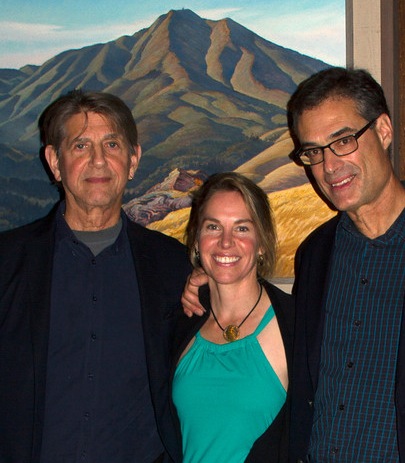
Peter Coyote, Camilla Fox and Dr. Robert (Bob) Crabtree at the Commonwealth Club, Mill Valley, CA
Calabasas Passes Anti-Rodenticide Resolution
On August 11, 2013, the city of Calabasas, CA passed a resolution urging businesses in Calabasas to neither use nor sell anticoagulant rodenticides and urging property owners to cease purchasing or using rodenticides on their land. The City of Calabasas also commited to not use rodenticides as part of its maintenance program for City-owned parks and facilities.
Calabasas’ adoption of this progressive resolution is a natural next step in the city’s commendable efforts to become a wildlife friendly community. Project Coyote spearheaded a successful effort to convince city officials to stop subsidizing the killing of coyotes and to instead adopt a progressive Coyote Coexistence Plan.
(Watch this video about the effort.)
Project Coyote Southern California representative Randi Felich has been an outspoken opponent of the sale and use of rodenticides. Her compelling testimonies led to the passage of resolutions opposing the use and sale of rodenticides in both Malibu and Calabasas, adding to the growing number of cities that oppose rodenticides.
Randi Felich talks to media in Calabasas
Good News for Wildlife!
Legislative Reform in CA
AB 711 Hunting ~
Non-lead Ammunition
Above photo: California Condor by US Fish & Wildlife Service (Public Domain)
California Governor Jerry Brown took a historic step toward ending the needless poisoning of wildlife from deadly lead by signing AB 711 into law. AB 711 makes California the first state in the nation to prohibit the use of lead ammunition for hunting, offering much needed protection to the endangered California condor and over 100 other species at risk of lead poisoning.
AB 1213 ~
Bobcat Protection
Above photo: Bobcat in Joshua Tree National Park by Nevin. (CC BY-NC-ND 4.0)
Introduced by CA Assembly Member Bloom, the Bobcat Protection bill makes it unlawful to trap any bobcat near Joshua Tree National Park and other national and state parks and refuges.
Read more here.
AB 789 ~
Trapping
Above photo: Kit fox in leg hold trap by David Syzdek. (CC BY 4.0)
Signed into law on August 26, 2013, AB 789 prohibits inhumane methods of killing wildlife, including drowning, chest-crushing, and injection with chemical solvents. AB 789 also reduces the allowable size of Conibear traps set on land from 10 to 6 inches and requires the use of warning signs on public lands in an effort to protect domestic dogs.
In the News
How to Coexist with Coyotes
By Jaymi Heimbuch
Mother Nature Network
09.26.13
Wolves & Human Well-being: Ecological & Public Health Concerns
By Dr. Michael W. Fox
San Diego Loves Green
10.09.13
Science Speaks for Wolves
By Karina Jelincich Grasso
San Diego Loves Green
10.07.13
The Marin County Livestock & Wildlife Protection Program ~ A Model for Coexistence
By Project Coyote
San Diego Loves Green
08.27.13
Download our free Coyote Hazing Guide Here
 Join our E-TEAM
Join our E-TEAM
Get periodic e-news, action alerts, and join our growing network of educators, scientists, predator friendly ranchers and citizen leaders who are helping people and wildlife coexist in our communities.
Join a growing community of educated and empowered citizens by expressing your commitment to compassionate conservation with a financial investment. You can DONATE, become a SPONSOR or leave a LEGACY GIFT.
